Presenting a flavour of responses from readers who have offered an extended take on people and places featured on these pages
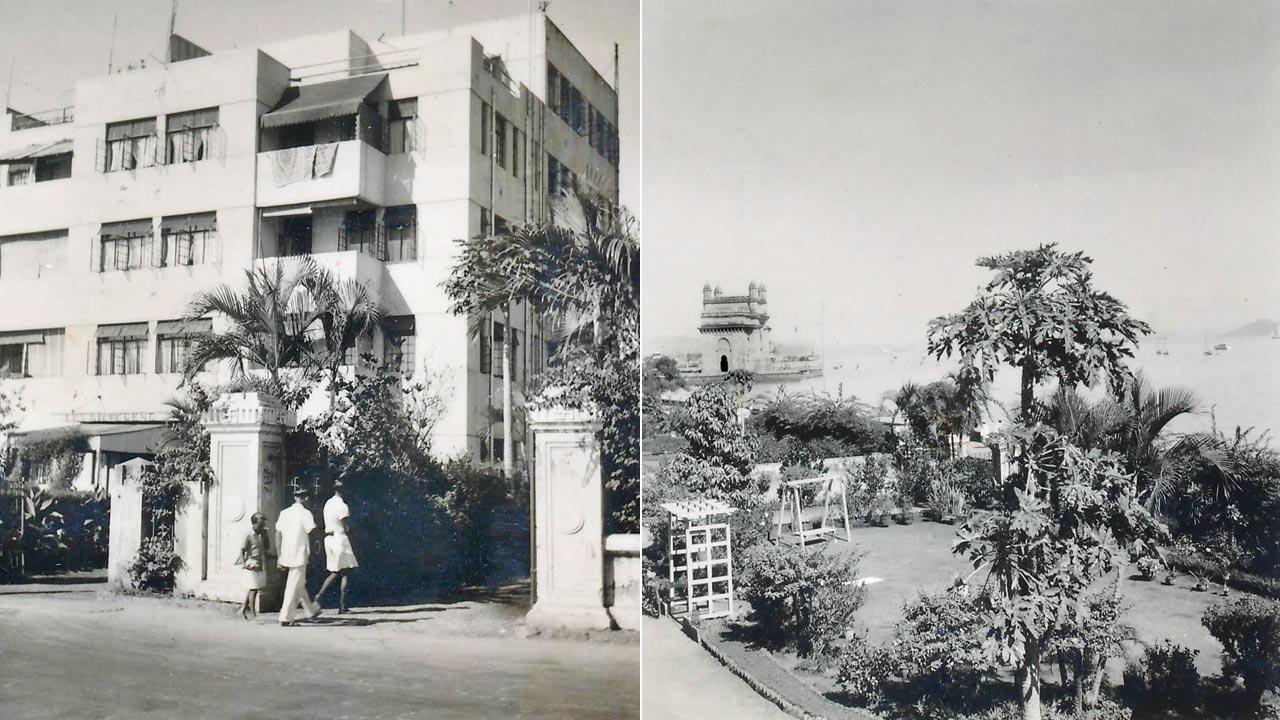
The Strand Road block of flats in Colaba where the Swenarton family lived in 1950-51, which is presently Sea Palace Hotel; view of a neighbouring garden from the same building, with the Gateway of India in the background. Pics/Joseph Swenarton
 Like every writer, I absolutely love hearing back from enthused readers. Which these pages happily elicit in heaps. Certain related nuggets of not just empty nostalgia, but also important factual narratives, prove most pleasurable and gratifying to receive. The add-ons are as wonderful as the appreciation. Much need vetting for accuracy, of course. Here are a few credible reactions.
Like every writer, I absolutely love hearing back from enthused readers. Which these pages happily elicit in heaps. Certain related nuggets of not just empty nostalgia, but also important factual narratives, prove most pleasurable and gratifying to receive. The add-ons are as wonderful as the appreciation. Much need vetting for accuracy, of course. Here are a few credible reactions.
ADVERTISEMENT
Visiting from the UK for a week in February and staying at the Taj, Mark Swenarton, Emeritus Professor of Architecture at the University of Liverpool, recently mailed to say that he was tracing spots in the city where his family lived in the early 1950s. One was close, on Strand Road, in the apartment block that is now the Sea Palace Hotel.
He wrote, “Your 2017 article, ‘On the Waterfront’, was an absolute gold mine for me, explaining so much about the history of the Strand Road development and the different buildings. My sister was born in Northcote Nursing Home nearby in 1950, so this really was gold dust! The post-Independence policy of Indianisation compelled my devastated parents to move back to England in 1954. For them it was paradise lost.”
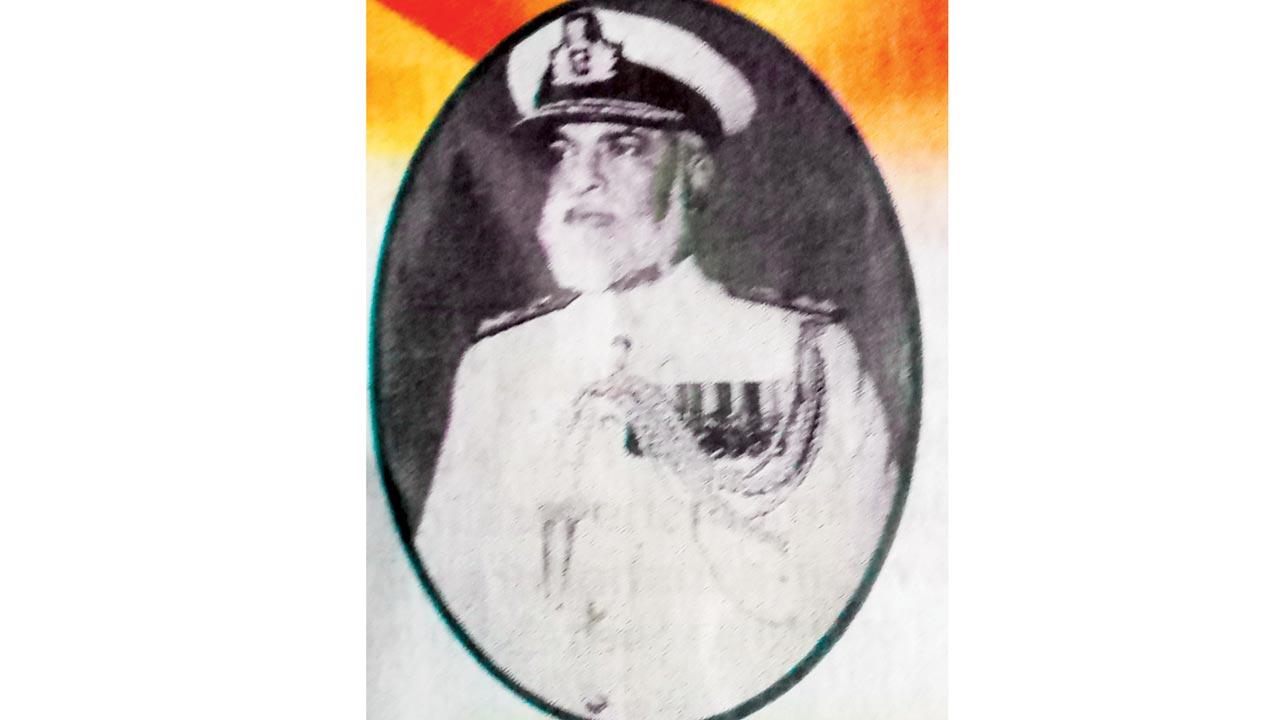 Vice Admiral Manohar Awati
Vice Admiral Manohar Awati
After this came a welcome barrage of information and images. Prof Swenarton’s parents touched Indian shores separately. Both pharmacists, they met in Bombay in the late 1940s. Born and raised in London, his mother Mavis worked for BDH (British Drug Houses, later part of Merck). During wartime, she was in charge of pharmaceutical supplies of the Royal Indian Navy, based first in Calcutta and then in Delhi. After the war she moved to Bombay. Joseph (Joe), his father, from Northern Ireland, went to India in 1940 to join the Royal Indian Navy. After the war he worked in a senior position in the Bombay office of the pharma company, Parke Davies.
I was amazed to learn that the building familiar to us as Sea Palace Hotel today—until it was drastically changed by alterations—was once a neat, modernist white box with emphatic horizontals of the balconies on each floor (on the north end), now closed in. “The front gardens used to be much bigger, before the road was widened. The hotel front desk told me this was by 18 feet, circa 1970,” Prof Swenarton footnotes, attaching photographs illustrating these features, taken by his father and reproduced from the family album by his sister Hilary Graham, a sociologist and professor in the health sciences department at the University of York. “The view from the Strand Road flat photo shows the front garden not of the adjacent house but the one after that. I looked at this quite carefully on site,” he concludes.
Incidentally, a booklet that the Taj chanced to give Prof Swenarton while he was leaving, displays the entirety of his family link with the seafront strip. Among them are the Yacht Club where Joe lived before marrying Mavis, and where their wedding reception was held; the Northcote Nursing Home where she delivered their first child Hilary; and the apartment block they lived in before it transformed into Sea Palace Hotel.
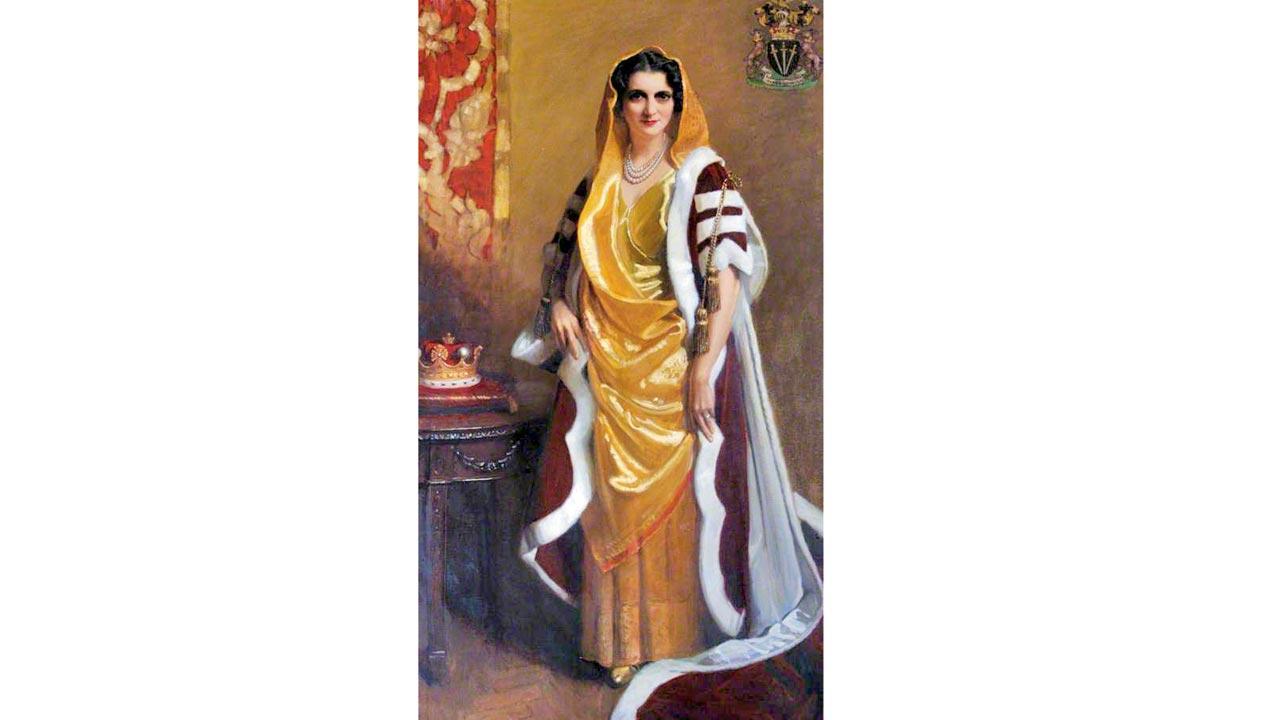 Marchioness Bapsy Pavry
Marchioness Bapsy Pavry
A different kind of feedback, Navy-related again, reached me on account of an earlier column featuring the socialite beauty, Bapsy Pavry, a resident of Sunama House at Kemp’s Corner. The daughter of a priest, she is considered the only Indian Marchioness in history. Wedding twice-married Henry William Montagu(e) Paulet, 16th Marquess of Winchester, in 1952, she was shocked when the aristocrat strayed to ex-girlfriend Eve Fleming, the mother of James Bond author Ian Fleming. Lonely and livid, Pavry flew to Eve’s home in the Bahamas for a flaming confrontation.
Reading another of my columns, narrating how Ian Fleming assisted the Navy head, Admiral John H Godfrey, in the Directorate of Intelligence between 1939-42 (the bestselling writer went on to base the cult character of “M” in his Bond books on Godfrey), Cdr Mohan Narayan (retd) responded with a fairly balanced assessment of the lady. The mercurial Bapsy Pavry had a benevolent side, with the Navy a surprised beneficiary of her altruism. First, though, for a bit of maritime history from Cdr Narayan to delve into, which well puts this story of providence in perspective.
Among the world’s leading shipbuilding centres for more than a century, the Bombay Dockyard (today’s Naval Dockyard at Mumbai) was the stomping ground of several generations of the Wadia clan, master shipbuilders unrivalled for constructing over 400 ships attaining iconic status for their robust longevity and fine workmanship. Among them, the HMS Asia, an 84-gun “second rate ship of the line” of the Royal Navy, was at the centre of action in many mighty conflicts and campaigns, including the 1827 Battle of Navarino (modern Pylos) in the Ionian Sea, as the flagship of Rear Admiral Sir Edward Codrington. It was the last major naval battle fought fully under sail. She carried on to serve with distinction in the Royal Navy till 1909 when she was sold.
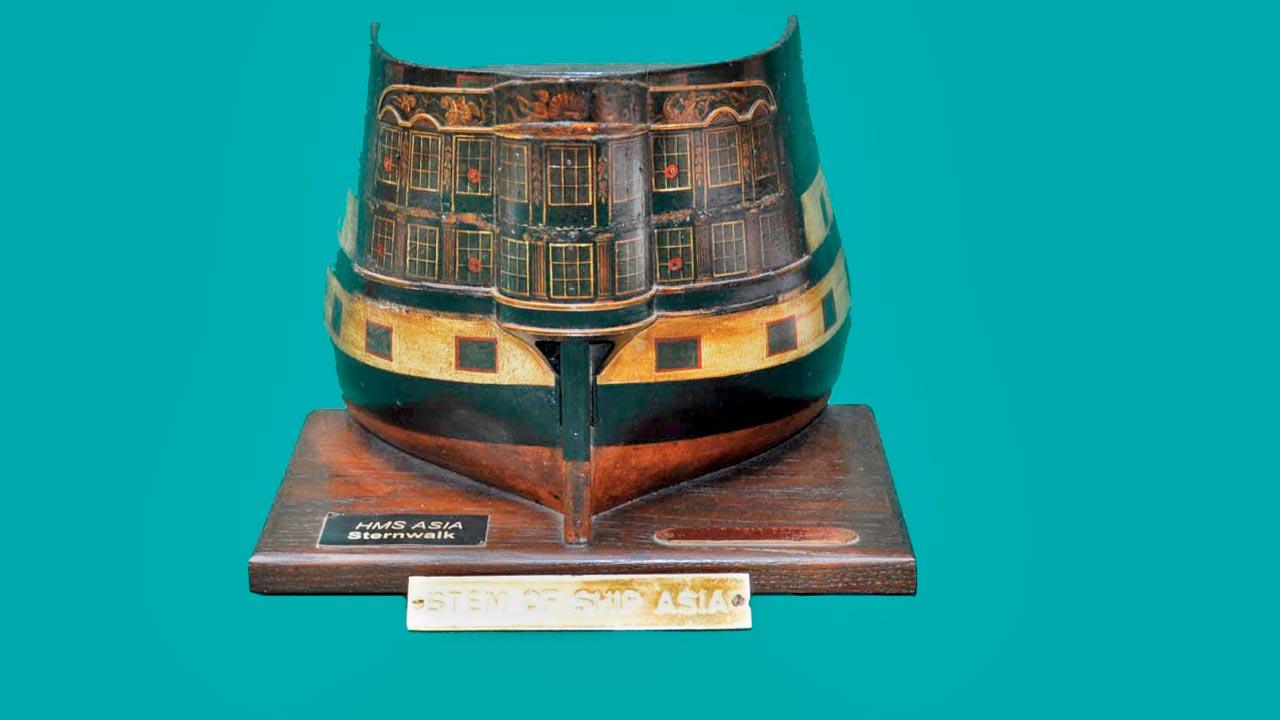 Sternwalk replica of the HMS Asia gifted by the Marchioness to the Vice Admiral
Sternwalk replica of the HMS Asia gifted by the Marchioness to the Vice Admiral
Cut to circa 1982. Cdr Mohan Narayan recalls Vice Admiral Manohar Awati, Commander-in-Chief of the Western Naval Command, narrate how he received a phone call in his office from JRD Tata, inviting him to Bombay House for a cup of tea and to meet a lady who had a surprise for the Navy. “Out of sheer respect for his friend, the VAdm acquiesced to this rather strange request. Mr Tata warmly introduced him to Bapsy Pavry.
Exchanging the usual pleasantries, he conveyed to the Vice Admiral that she was keen to present a piece of nautical memorabilia which would be of great interest to the Indian Navy, especially the National Maritime Museum at the Middle Ground Island Battery. And the Marchioness handed a superbly scaled-down replica of the sternwalk of HMS Asia to the VAdm.”
This artefact belonged to the family collection of the Marquess of Winchester. Though Bapsy Pavry and he had separated, they were not divorced; she continued to remain the Marchioness. As her good friend, JRD was aware the sternwalk would be of significant value to the Maritime History Society collection. That it was crafted from the original Malabar teakwood of the HMS Asia made for a sort of poignant homecoming. Thanking her profusely for the unexpected largesse, the Vice Admiral accepted the gift on behalf of the Navy and invited the Marchioness to the Maritime Museum. Accompanied by the Flag Lieutenant, she did indeed visit the next day.
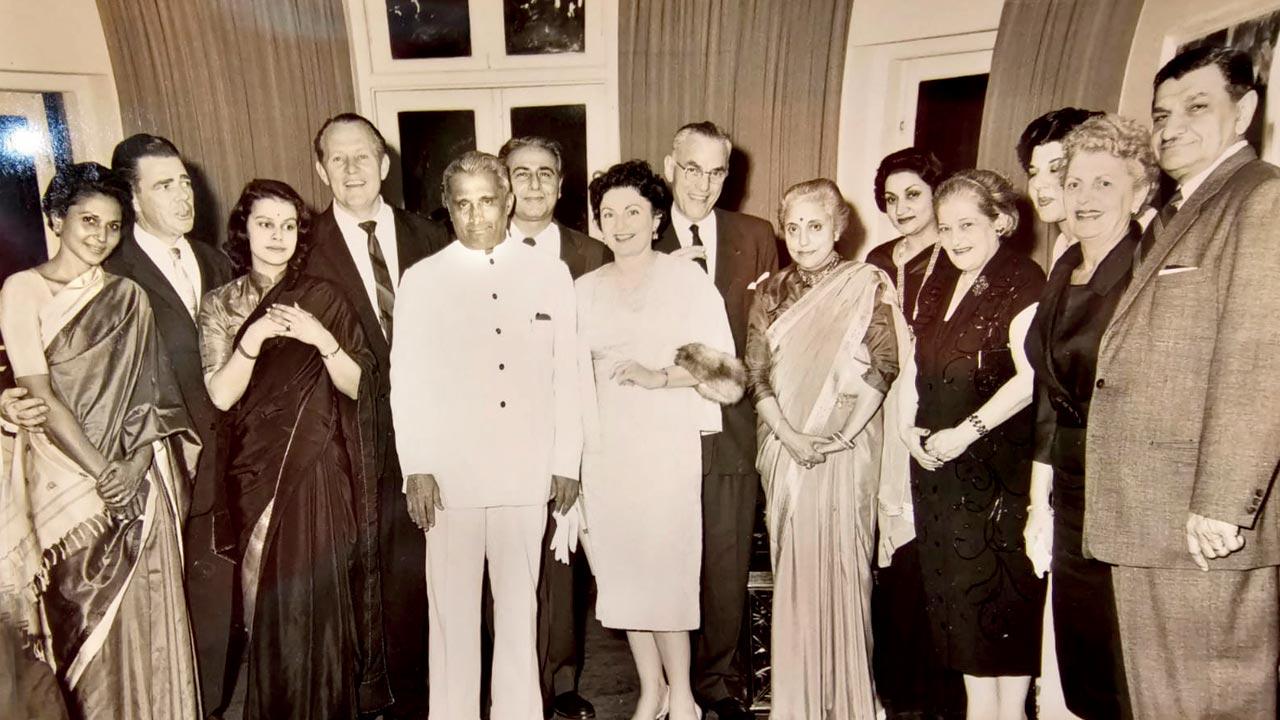 Keki Modi, Ellen Modi and Pepe Chorosch stand first, third and fourth from right respectively, in a photo captured at a dinner hosted by the Modis and graced by Hollywood guests. They pose with Lois Linkletter (centre, in a white dress), Naval Tata, SK Patil, Art Linkletter (fourth from left), Bob Andrews and Premila Wagle. Pic Courtesy/Maxie Cooper
Keki Modi, Ellen Modi and Pepe Chorosch stand first, third and fourth from right respectively, in a photo captured at a dinner hosted by the Modis and graced by Hollywood guests. They pose with Lois Linkletter (centre, in a white dress), Naval Tata, SK Patil, Art Linkletter (fourth from left), Bob Andrews and Premila Wagle. Pic Courtesy/Maxie Cooper
Cdr Narayan photographed this replica in 2011, when he curated the Navy’s Maritime Heritage Exhibition at the CSMVS Museum, where it was a prized item on view. Vice Admiral Awati related the incident to him while working together on shortlisting exhibits.
Moving on from navy lore to movie magic. Bumping into my painter-photographer friend Maxie Cooper at a wedding two months ago, I complimented her on the beautiful bead bag she carried. It turned out to have been hand-studded by the famous Russian seamstress Pepe Chorosch, whose classy embroidered creations adorning clutch purses and sequinned sarees, were ragingly popular. She was known to relish spicy dhansak meals at the table of Parsi clients whose wardrobes were rendered elegant by her master darzis.
Remembering my description of some celebrated denizens of Dongersee Road in Walkeshwar—where Madam Chorosch’s neighbours were culture czarina Pupul Jayakar, the Patiala gharana Hindustani vocalist Bade Ghulam Ali Khan, Governor Mangaldas Pakvasa and the Camas, owners of Asia’s oldest newspapers—Maxie sent a priceless set of photographs. In each of these, Madam C is seen posing prettily with a mouthwatering line-up of Hollywood veterans of the time.
A more apt fit would be hard to find: Maxie is the daughter of movie mogul Keki Modi (whose cinemas included New Empire, Excelsior and Strand), the younger brother of the legendary actor-director-producer Sohrab Modi. The photograph here is from the mid-1950s, at a dinner hosted by Keki and Ellen Modi at Kamal Mahal, their Carmichael Road home. The party was to honour American radio and TV personality Art Linkletter, the man behind comedy series like Kids Say the Darndest Things.
To my mention of Chorosch’s tailors fashioning the black saree Nargis wore for Awara in 1951, Maxie also elaborated, “I remember a publicity still from some decades ago, of Nargis wearing a sequinned blouse of the exact design of my mother’s saree, midnight blue sequins on a greenish yellow background.”
From personal photos to vintage vignettes, thank you all for taking the care to share.
To be gifted a stimulating exchange of ideas and inferences is pure treasure. Shukriyaan, dear reader.
Author-publisher Meher Marfatia writes fortnightly on everything that makes her love Mumbai and adore Bombay. You can reach her at meher.marfatia@mid-day.com/www.meher marfatia.com
 Subscribe today by clicking the link and stay updated with the latest news!" Click here!
Subscribe today by clicking the link and stay updated with the latest news!" Click here!







